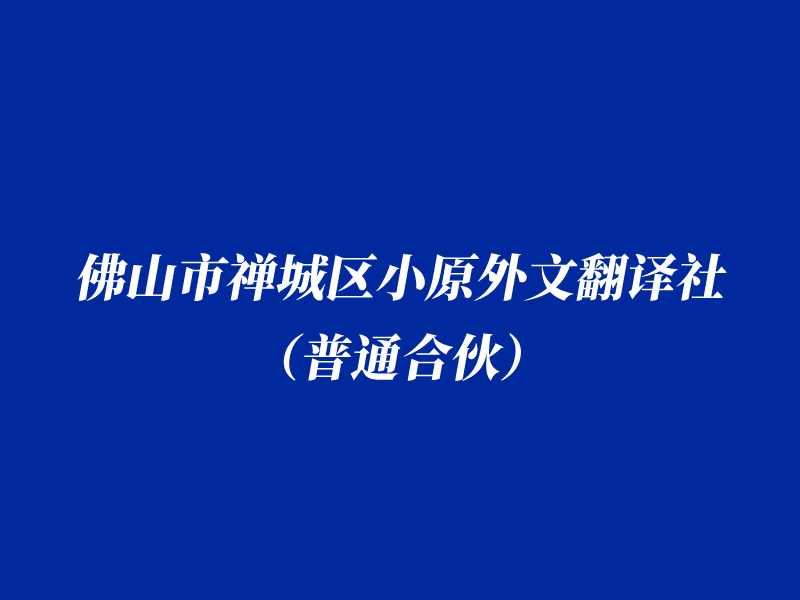Sep
2023
口译译员要善于在短促的时间内准确地把握两种语言的反复转换,下面佛山翻译证件翻译公司给大家分享口译工作需要注意什么问题?
The interpreter should be good at mastering the repeated conversion of the
two languages in a short time. What should be paid attention to when sharing the
interpretation work?
1、事前准备是做好口译的基础
1. Preparation in advance is the basis of good interpretation
接受口译任务后,一定要做一些必要的准备工作(时间可长可短,视具体情况而定),包括语言上、技术上和心理上的准备。首先要对翻译的内容有所了解。再则,就是找项目负责人了解情况,对项目情况熟悉了,翻译起来自然就比较顺手。口译工作有时侯是以讲课方式进行的技术交流。遇有这种情况,应对讲课人的课题内容,听众的基本情况都有所了解,才不至于临场慌乱。要重视和外宾的**次见面、安排日程等活动。这种活动一般不涉及很深的技术内容,我们可以把它看作正式翻译的一种准备。首先,你可以通过这种初次见面了解并逐渐适应外宾的语言、语调。搞翻译的人都知道,外国人的语音、语调五花八门。比如一个讲英语的代表团并不一定每个成员都来自英美国家,即使这样,也不一定都是正宗的英国人或美国人,其中往往有亚裔、非裔或欧裔等,其口音大不相同。这就要求口译人员不仅能听懂标准外语,而且要能很快适应各种怪腔怪调、不规范的外语。再则,通过初步接触,也能对谈判或讲课的内容有所了解(在事前没有充分的时间进行案头准备的情况下,这种了解十分重要),更为重要的是,这种初步接触可以消除临场的紧张感,为下一步正式场合的翻译做好心理准备。另外,还有一种准备方式,效果更好,这就是和讲话人共同准备,商定讲话纲要,这实际上等于先打一个草稿。有些场合可以这样做:如谈判时中方要提的问题、宴会或其它比较正式的场合可以预先准备讲话内容的开幕词和祝酒辞等。口译任务中**让人头疼的是讲话人事先准备了讲稿,照稿宣读,而译员对这份讲稿事前又一无所知。这无异乎用口译的方式做笔译的工作。一旦遇到这种情况,译员当然也不能回避,只能靠其平时的功底,尽自己**大努力来完成。
After receiving the interpretation task, we must do some necessary
preparations (the time can be long or short, depending on the specific
situation), including linguistic, technical and psychological preparations.
First of all, we should understand the content of translation. In addition, it
is to find the person in charge of the project to understand the situation. If
you are familiar with the situation of the project, the translation will be
easier. Sometimes interpretation work is a technical exchange in the form of
lectures. In this case, we should know the subject content of the lecturer and
the basic information of the audience, so as not to panic on the spot. We should
attach importance to the first meeting with foreign guests, scheduling and other
activities. This kind of activity generally does not involve deep technical
content. We can regard it as a preparation for formal translation. First of all,
you can understand and gradually adapt to the language and tone of foreign
guests through this first meeting. As all translators know, foreigners have a
variety of pronunciation and intonation. For example, an English speaking
delegation doesn't have to come from British and American countries. Even so, it
doesn't have to be authentic Britons or Americans, often including Asian,
African or European, with very different accents. This requires the interpreter
not only to understand the standard foreign language, but also to be able to
quickly adapt to all kinds of strange and irregular foreign languages. Moreover,
through preliminary contact, you can also understand the contents of the
negotiation or lecture (this understanding is very important when there is not
enough time for desk preparation in advance). More importantly, this preliminary
contact can eliminate the tension on the spot and prepare for the translation in
the next formal occasion. In addition, there is a better way to prepare, that
is, to prepare together with the speaker and agree on the outline of the speech,
which is actually equivalent to making a draft first. In some occasions, we can
do this: for example, the questions to be raised by the Chinese side during
negotiations, banquets or other more formal occasions, we can prepare the
opening speech and toast of the speech in advance. The most troublesome task of
interpretation is that the speaker prepared the speech first and read it out
according to it, while the interpreter knew nothing about the speech in advance.
This is no different from the way of translation. Once encountering this kind of
situation, the translator can't avoid it, and can only rely on his usual skills
and try his best to complete it.
2、编辑是做好口译的必要环节
2. Editing is a necessary part of interpreting
这里的编辑不是指文书编辑而是指译者在听清并理解了讲话人的话语后,要能够判断出哪些是他真正要讲的话,哪些是没有用的、重复啰嗦的废话,从而对其进行删减和调整。那么,这样做是否有悖于翻译的忠实原则呢?不。因为,口语自有口语的特点。讲话人在即席发言时,脑子里往往只有一个中心思想,但是具体表达和选词造句时常常是想到哪说到哪。有时讲话人为了阐述一个中心思想,会反复强调或用不同方式说明同一个内容。因此,口语不可能像书面语那样严谨,甚至有的讲话人本来就不善言词,经常会说出一些不完整的、不知所云的话。这种情况国内人有,外国人也有。这时,译员就要善于综合,要在不遗漏讲话基本内容的前提下,敢于删掉那些废话,使译出的话语条理清楚,语意完整,自成篇章。只有这样才能真正忠于讲话人的精神实质,否则一味追求逐字逐句的照译,反而会给人零乱、不忠的感觉。至于哪些话要译出,哪些话要删除,这要靠具有综合知识的译员去判断。绝不能以编辑为由对讲话人的话大打折扣,伤筋动骨。这不仅仅是翻译水平问题,而且也是翻译的职业道德问题。翻译中适当进行编辑为的是更好地传达讲话人的精神实质,而不是为了偷工减料或回避难点。
The editor here does not refer to the document editor, but refers to the
translator who, after listening to and understanding the speaker's words, should
be able to judge what he really wants to say and what is useless and repetitive
nonsense, so as to delete and adjust it. So, is this against the principle of
faithfulness in translation? No. Because spoken language has its own
characteristics. When a speaker is making an impromptu speech, there is usually
only one central idea in his mind, but when he expresses and selects words and
sentences, he often thinks of what to say. Sometimes in order to explain a
central idea, the speaker will repeatedly emphasize or explain the same content
in different ways. Therefore, spoken language can not be as rigorous as written
language, and even some speakers are not good at words, often saying some
incomplete, unintelligible words. In this case, there are both Chinese and
foreigners. At this time, the translator should be good at synthesis, dare to
delete those nonsense without omitting the basic content of the speech, so that
the translated words are clear, complete and self-contained. Only in this way
can we be truly loyal to the spiritual essence of the speaker. Otherwise, if we
blindly pursue word for word translation, it will give us a sense of disorder
and disloyalty. As for which words need to be translated and which words need to
be deleted, it depends on the translator with comprehensive knowledge to judge.
Never discount the speaker's words on the basis of editors. This is not only a
question of translation level, but also a question of professional ethics in
translation. Proper editing in translation aims to better convey the spiritual
essence of the speaker, not to cut corners or avoid difficulties.
3、记要点是确保翻译质量的有效手段
3. Remember the main points is an effective way to ensure the quality of
translation
记要点,是记讲话人的讲话要点而不是原讲话的句式和单词。由于口语工作的特点,需要在极短的时间内及时传达讲话人的意思,所以,要求译员在听懂原话的内容后立即忘掉原话的词汇和句式,用规范的另一种语言表达出来。如果不能立即忘掉原话的单词和句式,就容易造成译出的语言或者是汉语式的外语,或者是洋味的汉语,使听者感到别扭,影响交流。这里所讲的记要点可以是脑记也可以是笔记。有的翻译人员喜欢在翻译时用笔速记,试图把所讲的内容全部记下来,以为这样可以帮助记忆,我认为这样反而会妨碍记忆的速度和表达的准确,因为这样中间多了一道手续,等于把注意力分散了。当然,当一连出现好几个数字或人名地名时,由于中外文数字表达方式不同和英文名字难记的特点,翻译起来感到费力,所以借助笔记也是必不可少的。笔记不可少,但不宜太多。
To remember the main points is to remember the main points of the speaker
rather than the sentence patterns and words of the original speech. Due to the
characteristics of oral work, it is necessary to convey the speaker's meaning in
a very short time. Therefore, the interpreter is required to forget the words
and sentence patterns of the original words immediately after understanding the
content of the original words and express them in another standard language. If
we can't immediately forget the original words and sentences, it is easy to
cause the translated language or Chinese style foreign language, or foreign
flavor Chinese, which makes the listener feel uncomfortable and affects
communication. The main points of note taking here can be brain notes or notes.
Some translators like to take shorthand when translating, trying to write down
all the content they have said, thinking that it can help memory. I think it
will hinder the speed of memory and the accuracy of expression, because there is
an extra procedure in the middle, which is equivalent to distraction. Of course,
when several numbers or people's names appear in a row, it is difficult to
translate because of the different ways of number expression in Chinese and
foreign languages and the difficulty of English names, so it is necessary to use
notes. Notes are necessary, but not too much.
4、树立信心是做好口译的**
4. Confidence is the guarantee of good interpretation
不论什么场合,都要相信自己的翻译能力。如果没有信心,翻译过程中遇到几句听不明白的话,就会更加慌乱,越慌则越译不好。听不懂时,要实事求是,不能不懂装懂,凭感觉乱发挥。多问两次并不丢人,千万不能以为多问了显得水平低、丢面子,因而当问不问,造成错误。有时在翻译时漏译了几句,在译下面一段时因为上下文的关系又想起来了,这时可以直接补进去,而不必专门向听众说明。这种情况,很多译员可能都遇到过,特别是在外宾讲得兴奋、一口气讲很长时,或者是由于翻译时间长,译员脑力疲劳时容易发生这种情况。说明,反而容易分散听众的注意力,影响听众的情绪,当然也就影响了翻译的整体效果。
Believe in your translation ability no matter where you are. If you don't
have confidence, you will be more flustered if you encounter a few sentences
that you can't understand. The more flustered you are, the worse your
translation will be. When you can't understand it, you should be practical and
realistic. You can't pretend to understand it without knowing it, and play it by
feeling. It's not disgraceful to ask twice more. You should not think that
asking more is low level and disgraceful. Therefore, if you don't ask, you will
make mistakes. Sometimes a few sentences are missed in the translation. When the
next paragraph is translated, it is recalled because of the context. At this
time, it can be added directly without explaining to the audience. Many
translators may have encountered this situation, especially when the foreign
guests are excited, speak for a long time at a time, or because of the long
translation time, the interpreters are prone to mental fatigue. It shows that it
is easy to distract the audience's attention and affect the audience's mood,
which, of course, affects the overall effect of translation.
5、广博的知识是做好口译的前提
5. Extensive knowledge is the premise of good interpretation
口译工作,涉及面很广,有时事先无法预料。这就需要我们平时多注意知识的积累。科技翻译的译员一般比较重视专业知识的学习,但是,搞科技翻译只有专业知识和翻译知识是不够的,都说翻译是“杂家”,这话千真万确。翻译人员对百科知识不需要很精很深,但是要博、要杂。
Interpretation involves a wide range of work, sometimes unpredictably. This
requires us to pay more attention to the accumulation of knowledge. Generally
speaking, translators of sci-tech translation attach more importance to the
study of professional knowledge. However, it is not enough to only have
professional knowledge and translation knowledge in sci-tech translation. They
all say that translation is a "miscellany", which is absolutely true.
Translators don't need to be very precise and deep in encyclopedia knowledge,
but they need to be broad and complicated.
6、注意礼仪是对译员的基本要求
6. Attention to etiquette is the basic requirement for translators
此外口译人员也会遇到这种情况:出外考察和访问时,外国政要接见国内代表团的讲话,而这种讲话往往是单向的,很难指望讲话人会按翻译要求停顿,尤其是讲到感兴趣的地方会口惹悬河,滔滔不绝,结果听众不知所云,翻译无能为力。因为外宾不懂得翻译的难处,也没有讲话停顿的习惯。为了避免这种情况,译员要尽可能预先向讲话人提示。万一讲话人总是忘记停顿,译员也不宜过多插话要求停顿而表现出不安或不满,这样会有失礼貌,打断讲话人思路,尤其是对年长者或政府要人更要谨慎。口译工作是一种艰苦而细致的劳动,不但要求译员有较高的外语水平和熟练的翻译技巧,同时要求译员有较渊博的科学文化知识。因此希望有志于成为口译员的备考者们,在努力提高翻译技巧的同时,不要忘记在其他方面知识的吸收。
In addition, interpreters will also encounter this situation: when they go
abroad for investigation and visit, foreign politicians will receive the speech
of the Chinese delegation, which is usually one-way, and it is difficult to
expect that the speaker will stop according to the translation requirements,
especially when talking about the places of interest, which will cause trouble
and eloquence, resulting in the audience's ignorance and inability to translate.
Because foreign guests don't understand the difficulties of translation and
don't have the habit of speaking pause. In order to avoid this situation, the
interpreter should remind the speaker in advance as much as possible. In case
the speaker always forgets to pause, the interpreter should not intervene too
much to ask for a pause and show uneasiness or dissatisfaction, which will be
impolite and interrupt the speaker's thinking, especially for the elderly or the
important people of the government. Interpretation is a hard and meticulous
work, which requires not only a high level of foreign language and skilled
translation skills, but also a profound knowledge of science and culture.
Therefore, I hope that the candidates who are willing to become interpreters
will not forget to absorb other knowledge while trying to improve their
translation skills.
上一篇:交替传译需要做好什么?
下一篇:法语翻译怎样做好
- [07-27] 大环境下 全球翻译行业的市场走向和预测
- [07-28] 快速学习韩语的方法有什么
- [12-24] 汽车翻译从业人员的要求
- [09-27] 找营业执照翻译翻译公司时,看下这3点
- [05-26] 对外翻译人才应具备的素质和能力
- [10-16] 翻译价格与翻译质量的关系
- [03-09] 合同翻译常见什么错误?
- [02-19] 翻译怎样累积基本功?

-
地址1:佛山市禅城区汾江中路144号科华大厦1002室(创业大厦正对面)
电话:0757-82285965 13318391728
-
地址2:佛山市禅城区魁奇路澜石(国际)金属交易中心大厅一楼
电话:0757-82285965 13318391728




